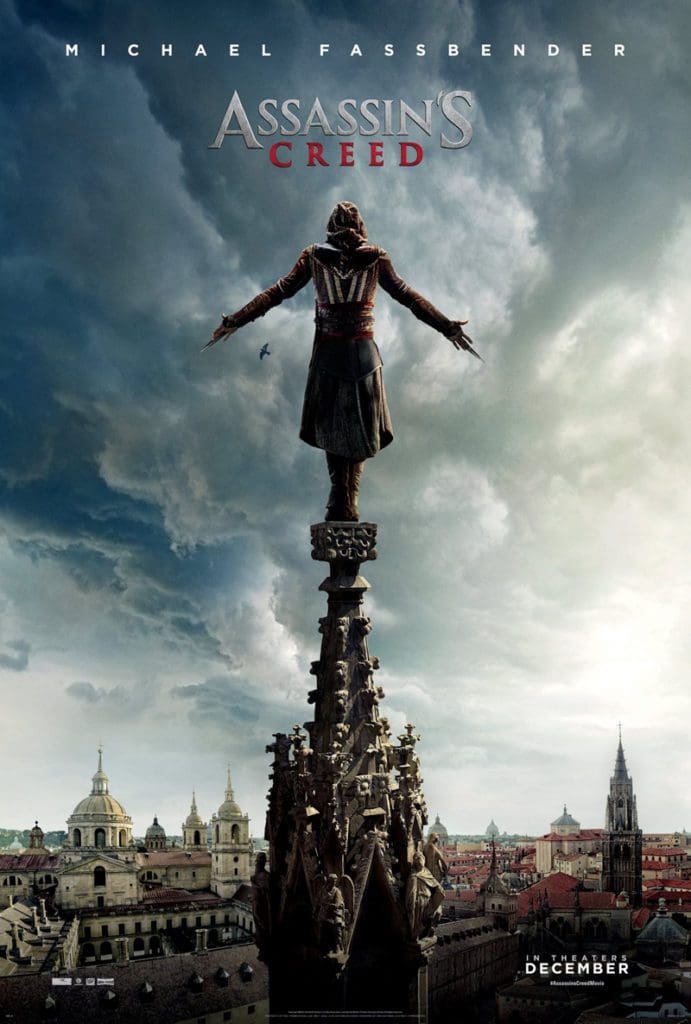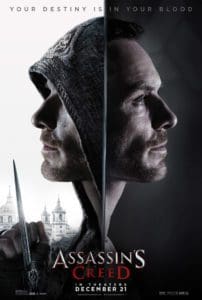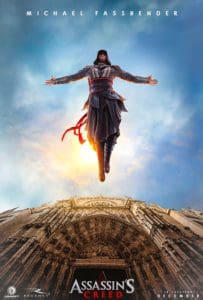Written by Matt Gilbert
 I’ve been a fan of the Assassin’s Creed series since the very first game in 2007. I stuck with the franchise all the way through Assassin’s Creed: Unity, at which point even I had to accept the fact that Ubisoft actually has no idea what they’re doing anymore. I watched the series go from interesting experiment to revolutionizing the whole open-world template to becoming the butt of everyone’s jokes at every E3 for the past several years. I still have yet to play last year’s Syndicate, but from my understanding of critics and friends’ reactions, it may have been a long-awaited step back in the right direction. So, naturally, when a movie based on the platforming historical adventure series starring Michael Fassbender was announced back in 2012, I felt the familiar surge of excitement and misguided optimism.
I’ve been a fan of the Assassin’s Creed series since the very first game in 2007. I stuck with the franchise all the way through Assassin’s Creed: Unity, at which point even I had to accept the fact that Ubisoft actually has no idea what they’re doing anymore. I watched the series go from interesting experiment to revolutionizing the whole open-world template to becoming the butt of everyone’s jokes at every E3 for the past several years. I still have yet to play last year’s Syndicate, but from my understanding of critics and friends’ reactions, it may have been a long-awaited step back in the right direction. So, naturally, when a movie based on the platforming historical adventure series starring Michael Fassbender was announced back in 2012, I felt the familiar surge of excitement and misguided optimism.
Once again, I got excited. I awaited trailers. I made excuses for what looked like inconsistencies or inaccuracies on the grounds of the transition from game to film. I walked into the theater believing that I could finally get a great video game movie and that the concept might finally be proven. But as the credits started to roll, the feeling I was left with matched with what could at best be described as “well, it wasn’t as bad as it could have been.”
Justin Kurzel, director of 2015’s Macbeth, also starring Fassbender and Marion Cotillard, shows incredible promise as a filmmaker, but feels wasted on the wrong project. Assassin’s Creed makes it clear the writers either never played the games before beginning work, or they never fully understood them. The audience is dropped into the complex and deeply-rooted war between Assassins and Templars immediately through a wall of expositional text before the movie shows anything. Unfortunately, much of the devastation the two groups left in their wakes over centuries is left either entirely to the imagination, or for fans of the games to fill in themselves. The film’s present-day sections (about 70% of the movie) suffer greatly from a tell-don’t-show mentality. It relies on its stacked cast to provide all information or backstory through various two-person conversations, and foreboding talk about what could happen if the Templars find what they are seeking. But nothing ever comes to much of a head, so the movie cannot even be excused with the accusation of too much buildup before a satisfying payoff.
The other 30% of Assassin’s Creed is spent inside the animus, as Fassbender’s character, Callum Lynch, is hurled into the DNA-locked memories of his 15th century ancestor from the Spanish Inquisition. It is these sequences in particular that highlight why Kurzel was the obvious choice to bring Assassin’s Creed to life. Kurzel has an unshakable devotion to authenticity and seems to spare no expense to make these three scenes the crux of the film. Every section with Lynch’s ancestor, Aguilar, is entirely in Spanish and relies on practical effects over CG. Each one turns into an action scene with incredible direction and choreography. Kurzel borrows heavily from the game series and their influence can be found in the Assassins’ combat forms, as well as their parkour running across the rooftops of Spain. Fans will be happy to see a particular iconic move from the games make its way into the movie. Kurzel’s devotion to practical effects means Assassin’s Creed now holds the record for highest stunt free fall in a film.
The present-day sections would be easier to swallow if they did not take up such a significant majority of the movie, and if the characters had just a little bit of life to them. Fassbender does what he can with Lynch, but his backstory is uninteresting and his stoic anger is just boring. His work as Aguilar is very impressive but there’s no depth to his character at all. Cotillard plays Dr. Sophia Rikkin, easily the actress’ blandest character in years. Jeremy Irons is Sophia’s father, Alan Rikkin, who fans of the games will recognize as the CEO of Abstergo, the corporation fronting the modern day Templar Order. Michael Kenneth Williams appears every now and then as another prisoner of Abstergo. There is shockingly little to his character besides the occasional “tough guy” one-liner, and it feels like he serves no purpose until the third-act final battle. The movie fails to grasp the memorable and entertaining characters that made installments like Assassin’s Creed II and Brotherhood such unforgettable and revolutionary classics. Instead, it focuses on packing all the necessary exposition to try to make the world make sense.
Assassin’s Creed runs into much of the same problem that made Duncan Jones’ Warcraft such an unendurable slog. The priority of exposition and appeasing the fans by including as much lore from the source material as possible weighs the movie down, and makes the satisfying action sequences (more Creed than Warcraft) feel too few and far between. In truth, maybe these big moneymaking franchises are the wrong choice for film adaptations altogether. It makes sense on paper because the audience already exists, but the amount of lore introduced in several 15-20 hour games cannot be appropriately packed into a mere two-hour movie. Perhaps Hollywood would have better luck with games that stand on their own as great stories that need only be recreated rather than reimagined. Perhaps we’ll find out if Sam Raimi’s The Last of Us movie ever gets off the ground.
What makes Assassin’s Creed so frustrating is how the movie is not all so bad when compared to the lesser games of the series. The plots are confusing, and the characters are awful, but no less confusing than the plots of Revelations, or no less awful than Unity. It actually almost stands as an improved retelling of the very first game as Michael Fassbender can do more for an audience than Desmond Miles ever could. Compared to disasters like Warcraft, Hitman Agent 47 or Need for Speed, Assassin’s Creed might actually be the top tier. But as a movie, its script is terribly clunky and a newcomer would be excused for dismissing it as an inane attempt at science-fiction. The animus scenes are truly excellent with phenomenal cinematography and editing. With this kind of fight choreography, it would feel foolish to hope for such an uninteresting and disappointing movie. It may be a step in the right direction for video game movies, but it’s still a failure. There is still very far to go before one can be declared a success. Everything is permitted, but this script shouldn’t have been.



